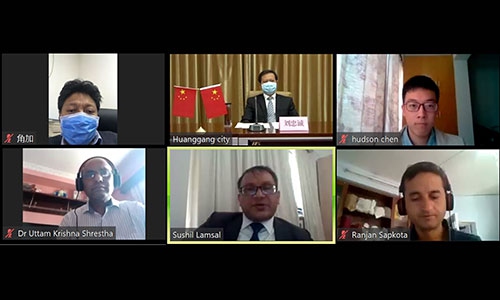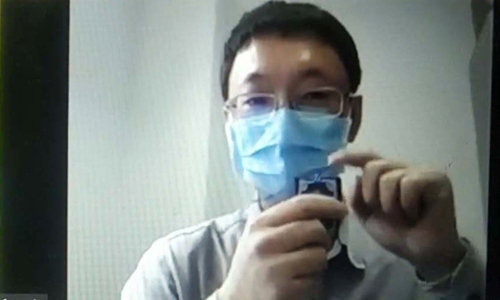China, Nepal discuss Tibetan medicine for COVID-19 relief
By Shan Jie and Hu Yuwei Source:Globaltimes.cn Published: 2020/4/20 5:34:02

Photo: Courtesy of the Student Association of Belt and Road Initiatives at Tsinghua University
Tibetan medicine, similar in some ways to Traditional Chinese Medicine (TCM), was introduced as a solution for novel coronavirus (COVID-19) by Chinese medical experts to Nepal via an online conference on Saturday as part of China's efforts to help Nepal tackle the global pandemic.
Since the outbreak, the Beijing Hospital of Tibetan Medicine has donated "Nine-flavor epidemic prevention powder" sachets to Nepal and other Belt and Road (BRI) countries, according to Feng Xin, deputy director of the Department of Medical Affairs at the Beijing Hospital of Tibetan Medicine.

Feng Xin, a doctor with the Beijing Hospital of Tibetan Medicine discusses the “Nine-flavor epidemic prevention powder.” Photo: Courtesy of the Student Association of Belt and Road Initiatives at Tsinghua University
The sachets enhance the respiratory tract's ability to protect itself from the virus while purifying the surrounding air, Feng said during the Coordinated Efforts against COVID-19 video conference between China and Nepal.
Jiao Jia, a doctor from the Beijing Hospital of Tibetan Medicine introduced the basic theories of Tibetan medicine on treating plagues. Tibetan medicine calls for obeying natural rules and maintaining mental and physical health simultaneously.
Sachets with the same recipe were used during the 2003 SARS outbreak.
Roughly 20 experts joined the discussion hosted by the Student Association of Belt and Road Initiatives at Tsinghua University in Beijing and directed by the Nepalese Embassy in China.
Huanggang Vice Mayor Liu Zhongcheng in Central China's Hubei Province, discussed his city's experiences with fighting the virus where 2,907 people were infected with COVID-19.
A frontline doctor, Zhou Ning from Wuhan Tongji Hospital, discussed how medical personnel can protect themselves and how to save and treat patients in ICU. Zhou also answered questions from Nepalese doctors about the virus, medicine use, and surgery procedures.
Tibetan medicine, otherwise known as Sowa Rigpa in Tibetan, is over 2,000 years old. The medicine was developed on the Qinghai-Tibet Plateau. In the past decades, it has prospered in China with public policy support.
In November 2018, UNESCO inscribed China's Lum medicinal bathing of Tibetan medicine, on the Representative List of Intangible Cultural Heritage of Humanity.
Nepal's Ministry of Health and Population confirmed 14 new COVID-19 cases on Sunday, the largest single-day increase, bringing the total number of COVID-19 cases to 31 in the country.
People and organizations across China have been helping Nepal tackle the COVID-19 outbreak.
On the 4th day of Nepal's national lockdown, just as the lockdown was lifted in Wuhan, two Chinese NGOs worked with Nepalese organization Safa Sanaulo Nepal and volunteered to build public hand-washing stations to help the locals and alleviate Nepal from a water shortage amid the pandemic.
The project, initiated by China Foundation for Poverty Alleviation Nepal office and the Tibetan Good Will Foundation, with support from the local government, plans to build around 180 handwashing stations in refugee and vulnerable communities, and along Nepal-India borders.
They also aim to use posters in cities around the Kathmandu valley to educate residents on how to prevent infections.
Moreover, the government of Southwest China's Tibet Autonomous Region donated medical supplies to Nepal in return for the help China has received from the Nepalese government during earlier outbreaks.
The supply includes virus detection devices, nucleic acid test kits, sampling tubes, protective medical clothing, N95 face masks, body temperature readers, and disinfectant wipes.
Tibetan officials expressed their sympathy to the risks Nepal is facing and hoped the medical supplies would provide relief from supply shortages and contribute to the fight against COVID-19.
The move follows an earlier donation from Southwest China's Sichuan Province that arrived in Kathmandu and was handed over to the Nepali Health Minister Bhanu Bhakta.
The supplies include different face masks, thermometers, Chloroquine phosphate tablets, protective clothing, and portable ventilators weighing 1.1 tons, media reported. Similarly, the donation from the Alibaba Foundation and Jack Ma Foundation included 100,200 N95 masks and 20,064 test kit.
"With China keeping Nepal in its priority list and sending supplies at this difficult time is really commendable," said Bhakta, Xinhua News Agency reported.
"We will try our best to send other necessary supplies as soon as possible. In case of any emergency, we can send a medical expert team or arrange a video conference meeting as well to help the health workers here," the Chinese Ambassador to Nepal Hou Yanqi said.
RELATED ARTICLES:
Posted in: DIPLOMACY